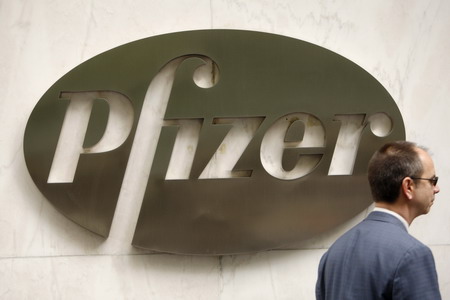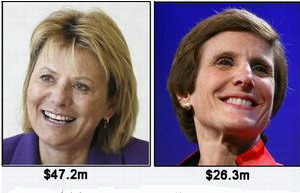World Business
Profit exports import tax cuts
By Jesse Drucker (China Daily)
Updated: 2010-05-15 10:03
 |
Large Medium Small |
|
 |
|
Overseas tax savings increased Pfizer's net income by $1 billion last year, according to tax consultant Robert Willens. [ANDREW HARRER / BLOOMBERG] |
NEW YORK - Over the past three years, Pfizer Inc was an earner without profit in its own country.
The maker of the cholesterol medication Lipitor, the world's top-selling prescription drug, reported almost half its revenues in the US for 2007 through 2009, while booking domestic pretax losses totaling $5.2 billion.
Abroad, it was another story. A Dutch subsidiary more than made up for New York-based Pfizer's American losses. It reported pretax profits totaling $20.4 billion in 2007 and 2008 - with a tax expense of 5 percent, a seventh of the top US rate. Overseas tax savings increased the drugmaker's net income by $1 billion last year, according to Robert Willens, a tax consultant in New York.
Pfizer is one of thousands of American companies that bolster their profits by attributing income to subsidiaries in countries with lower income tax rates, legally cutting their tax bills. Eli Lilly & Co and Oracle Corp were among other big companies that helped drive a 70 percent increase in accumulated earnings abroad that weren't taxed in the US from 2006 to 2009, according to data compiled by Bloomberg.
"An inordinate concentration of profits in a low-tax country, way out of proportion to actual economic activity, is a sure sign of aggressive tax planning," said Martin Sullivan, a tax economist who formerly worked for the US Treasury and Arthur Andersen LLP.
Willens, the president of Robert Willens LLC, a consulting firm in New York that advises investors on tax issues, analyzed financial filings for last year by Pfizer, Lilly and Oracle and found:
* Pfizer increased net income by 13 percent compared with what it would have been without the tax benefit from foreign earnings. The company's $8.6 billion in net income would have been $7.6 billion, Willens said.
* Lilly increased its 2009 net income by 21 percent to $4.3 billion from $3.6 billion, Willens found.
* Oracle reported $5.6 billion in net income last year, 14 percent more than it would have reported without foreign earnings taxed at lower rates, according to the analysis.
To be sure, each of those companies has actual sales abroad, although often in countries with tax rates similar to the US, which has an average combined state and federal corporate income tax rate of about 39 percent.
|
||||
Dozens of US companies attributed income to foreign subsidiaries in 2008 that exceeded their share of actual sales abroad, according to offshore corporate records and US securities filings compiled by Standard & Poor's Capital IQ. In some cases, the foreign units employ few or no workers.
For pharmaceutical and technology companies it's relatively easy to shift ownership of patents and other intellectual property abroad, said Sheldon S. Cohen, a former IRS commissioner who is now a director at the investment firm Farr, Miller & Washington LLC in Washington.
In a typical arrangement, a company will license the overseas rights for a patent developed in the US to a subsidiary in a low-tax country, said Michael C. Durst, special counsel at Steptoe & Johnson LLP, in Washington. That permits income from foreign sales to be attributed to the low-tax country.
Treasury Department regulations require that prices paid between subsidiaries, such as licensing fees, be based on what unaffiliated companies would pay. Payments among Pfizer's subsidiaries are supported by economic studies of similar third-party transactions, said Joan Campion, a company spokeswoman.
"All our transactions satisfy all arm's-length requirements," Campion said.
An Irish subsidiary of Oracle that has no employees and paid no income tax in 2006 and 2007 was responsible for roughly a quarter of the parent's pretax income of $10.8 billion in those years, according to Irish records and Oracle's US securities filings.
The unit distributes products "primarily in the European market" that were developed by the Redwood City, California-based company and "jointly funded under a cost sharing arrangement", according to its annual report from 2007, the most recent year available.
Ken Glueck, a senior vice-president for Oracle, declined to answer questions about the company's use of transfer pricing.
Bloomberg















